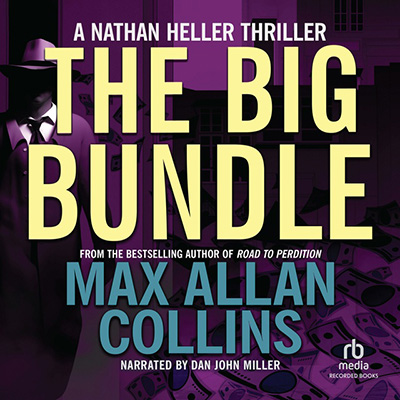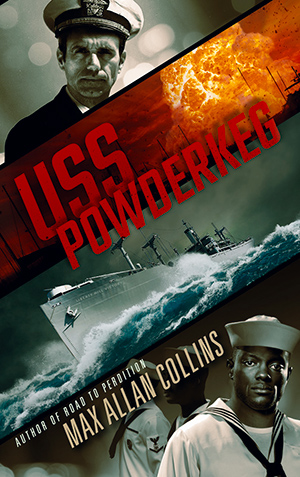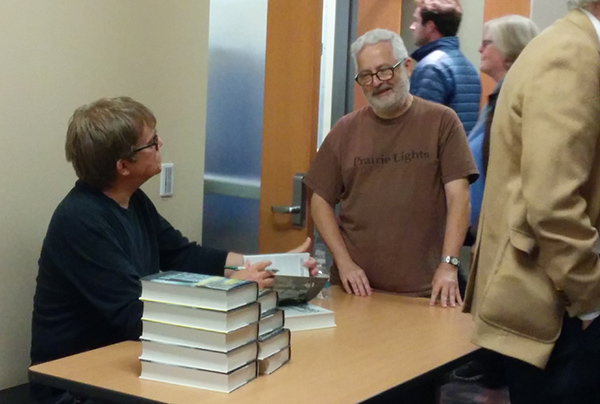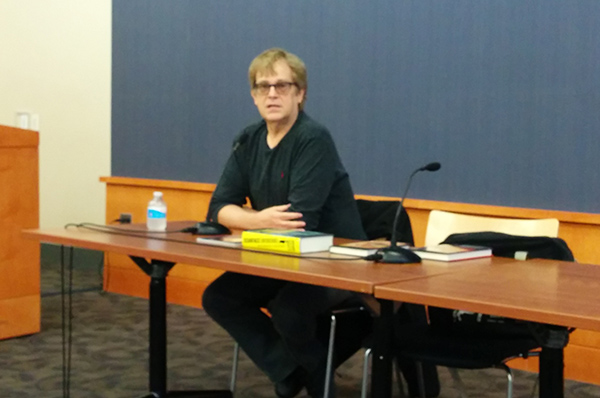We have a book giveaway this week – ten copies of the hardcover of The Big Bundle. You agree to write a review for Amazon and/or other on-line reviewing sites, like Barnes & Noble or even your own blog. This is for USA only – overseas is, I’m afraid, too expensive.
[All copies have been claimed. Thank you! –Nate]
The book will be out in about a week and a half, so time’s a wastin’. (I may not be writing Caleb anymore, but some things get in your blood.)
The audio may or may not already be available – I haven’t been able to determine that. But it will definitely be out when the book itself is released (it’s out there now on e-book). Barb and I listened to the first third of it on a jaunt to Cedar Rapids yesterday, and Dan John Miller is simply brilliant as Nate Heller and this extensive cast of characters. He’s always good but he’s outdone himself here.
We hope to include Mickey Spillane’s Encore for Murder on a Blu-ray/DVD release of the expanded Mike Hammer’s Mickey Spillane documentary, which Phil Dingeldein and I are working on right now. I think this makes more sense than releasing it on its own, because it is after all a local production, even with the commanding presence of Gary Sandy, who I think is really terrific as Mike.
But the experience of shooting the play (which we did live, as well as two dress rehearsals) and then editing the footage into a kind of movie got those juices flowing again. I honestly didn’t think, post-heart surgery, that doing a film project was possible. But this showed me, on a more limited scale, a project was possible.
We are going after grant money to get Blue Christmas off the ground. It will be, to say the least, a low budget production. Probably $75,000 plus that much again “in kind.” We initially were going to mount it as a play and shoot it that way, as we had with Encore for Murder, only with actual pre-production, as opposed to me just realizing we might have hold of something and oughta shoot it.
If the grants don’t come through, we would still do it, most likely, and would go the play route in the fall, with four cameras recording two dress rehearsals and two performances. We will be in a smaller theater – at Muscatine Community College, where years ago Barb and I fell in love and I later taught for a while – and if we do shoot it film-style, that black-box theater will be converted into a studio.
There is a part of me – the part of me that loves movies at least as much as I love books – that wishes I had gone the film route. There is a power to Chinatown, Vertigo and the Aldrich/Bezzerides Kiss Me Deadly that in my experience can rarely be touched in a book. (Feel free to disagree. I was shaped as a storyteller more by Hammett, Chandler, Spillane and Cain than by TV or movies. So I get that view.)
But I also like the collaborative aspect of making a film. It’s part of why I’ve stayed active with my band since 1974 (and from 1966 to 1971 before that). I am fine with working by myself, and as an only child am a loner. And the control that can be exercised in writing a novel or story is all-inclusive – nobody tells me what to do.
In collaborations, however, the human interaction is compelling and rewarding. Since I am a natural leader – I don’t know how to behave otherwise (I’m not proud of it) – I still tend to hold sway over the decision making. But that input from others makes the result far richer.
We are also in the “bucket list” area – not a term I love. But I am going to be 75 on March 3 (start shopping now!) and (like I said before) time’s a wastin’.
I began having a sense of the ticking clock well before my health issues kicked in. I started ticking off dream projects as early as Mommy, which was all about my obsessive desire to see Patty McCormack play a grown-up variation on The Bad Seed. USS Powderkeg (also published Red Sky in Morning) was about honoring my father and getting his WW2 story, with all its racial implications, told. Black Hats represented my desire to do a Wyatt Earp book.
Sometimes bucket list projects have foisted themselves on me. I thought Eliot Ness: An Untouchable Life was my last word on Ness. But Brad Schwartz convinced me we should write the definitive history of both Ness in Chicago and in Cleveland – though the instigator was Ken Burns. When he got Ness wrong in his Prohibition documentary series, by listening to uninformed, biased “experts,” those two massive books Brad and I did became necessary.
Blue Christmas is a story that has great meaning for me. As I’ve said here before, it was a story written on Christmas Eve 1992 – all fifty pages of the novella, in one fevered sitting – that got me back up on the pony to ride, after the bastards at the Tribune took Dick Tracy away from me.
I, of course, did not realize the Tribune had done me a favor, because I was about to fill the slack with Road to Perdition. I know I’ve mentioned this before, but I also think about what Dean Martin said: the two best things that ever happened to him were teaming up with Jerry Lewis…and breaking up with Jerry Lewis.
The great Ed Catto has written a lovely piece about Ms. Tree. Don’t miss this one. It’s right here.
J. Kingston Pierce was nice enough to say this at the Rap Sheet: “Among the non-fiction releases I look forward to seeing (is) Spillane: King of Pulp Fiction, Max Allan Collins and James L. Traylor’s ‘first ever’ biography of ‘the most popular and most influential pulp writer of all time.’” See that in context here.
Here’s a nice look at Jacques Futrelle, the detective mystery writer who starred in my The Titanic Murders. (I rate a mention!)
You may have already seen this interesting article on Quarry, but it’s worth at least one look.
M.A.C.















